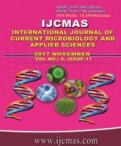


 National Academy of Agricultural Sciences (NAAS)
National Academy of Agricultural Sciences (NAAS)

|
PRINT ISSN : 2319-7692
Online ISSN : 2319-7706 Issues : 12 per year Publisher : Excellent Publishers Email : editorijcmas@gmail.com / submit@ijcmas.com Editor-in-chief: Dr.M.Prakash Index Copernicus ICV 2018: 95.39 NAAS RATING 2020: 5.38 |
The study on screening of okra genotypes against fruit borer (Earias spp.) infestation was conducted using 76 genotypes viz., 21 parents, 54 F1hybrids and one commercial check (MHY-10) in a randomized block design and replicated twice. Analysis of variance revealed significant differences among the genotypes resulting in incidence of fruit borer ranged from 5 (KON-12) to 45 percent (KON-6) among the parents. However, parents KON-12 (5.00%), KON-5 (5.08%), KON-15 (7.50%) and KON-10 (10%) are the highly resistant which recorded the lowest fruit borer infestation. Among the hybrids, the minimum incidence (10.00%) was recorded in the cross KON-8 x AAN which proved to be highly resistant, whereas, the cross KON-12 x AAN showed susceptibility by recording maximum fruit borer infestation (87.50%). Compared to parents and hybrids, commercial check (MHY-10) reacted as tolerant by incidence of 28.75 per cent fruit borer infestation. Hence, the present study conclude that, genotypes which showed resistant reaction can be used in further breeding programmes to develop varieties / hybrids resistant to fruit borer along with good agronomic traits.
 |
 |
 |
 |
 |